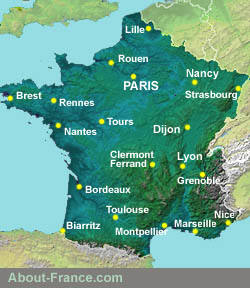- Explore France ►
- KEY PAGES
- Where to go
- How to get there
- Learn about France
French grammar: prepositions
How prepositions are used in French
| Page index: | Using the word de | Prepositions of position and direction | Prepositions of time and relation |
1. The preposition "de"
"De" is by far the most common preposition in French, and a word with multiple meanings.
Its most common uses are:
a) To signify possession or attribution - the equivalent of the English preposition "of" or " 's "
Jeanne's house: la maison de Jeanne ,
The chairman of the company : le président de l'entreprise
The dog's owner was Monsieur Brun Le propriétaire du chien était Monsieur Brun.
b) A preposition of direction, equivalent to the English preposition "from"
He's coming from Paris Il vient de Paris,
It's a gift from Pierre. C'est un cadeau de Pierre.
c) A preposition of relation, equivalent to English " by" or "of"
It's a play by Shakespeare - C'est une pièce de Shakespeare
At the side of the road: au bord de la route
At the top of the mountain : au sommet de la montagne
c) As a coordinator between two verbs, equivalent to the coordinators in English (of, to, about etc)
He's talking about coming next week. Il parle de venir la semaine prochaine.
I'm trying to do it.
2. Prepositions of position and direction
The table below lists the most common prepositions of position and direction, and corresponding adverbs. Most of the prepositions in this table can signify either direction or position; meaning will be distinguished by logic and context. In this table, rare and unusual forms are omitted or listed in brackets. This table is by no means an exhaustive guide to French prepositions; in idiomatic usage, other prepositions may be used for a given meaning.
| Prepositions | Adverbs | Common meanings / English equivalents |
| à | At, in, (position) to (direction) | |
| jusqu'à | Upto, as far as, until | |
| vers | Towards | |
| dans, en |
dedans | In, within, into |
| sur, au dessus de |
dessus, au dessus | On, on top (of), Over, above |
| Sous, en (au) dessous de |
dessous,
en (au, là) dessous |
Under, below |
| à côté de | à côté | Beside |
| devant | devant | In front of |
| derrière | derrière, à l'arrière |
Behind |
| auprès de | Next to | |
| près de | (tout) près | Near |
| de, depuis | From, out of (and other meanings; see above) | |
| entre | Between |
Note also one preposition for which English has no specific prepositional equivalent: chez. Chez can be a preposition of direction or a preposition of situation, and corresponds to "to/at (my) place".
Some examples:
Prepositions of position:
I live in a flat. J'habite dans un appartement.
I live in town: J'habite en ville
The money is on the table: L'argent est sur la table
I live at Pierre's place: J'habite chez Pierre
Adverbs of position:
He's inside : il est dedans (il est à l'intérieur)
Prepositions of direction:
Put all those bits into the box. Mettez toutes ces pièces dans la boite
We're going into town. Nous allons en ville.
They're coming to our house this evening. Ils viennent chez nous ce soir.
Adverbs of movement:
I can't put the money in. Je ne peux pas mettre l'argent dedans.
Prepositions of position:
I live in a flat. J'habite dans un appartement.
I live in town: J'habite en ville
The money is on the table: L'argent est sur la table
I live at Pierre's place: J'habite chez Pierre
Adverbs of position:
He's inside : il est dedans (il est à l'intérieur)
Prepositions of direction:
Put all those bits into the box. Mettez toutes ces pièces dans la boite
We're going into town. Nous allons en ville.
They're coming to our house this evening. Ils viennent chez nous ce soir.
Adverbs of movement:
I can't put the money in. Je ne peux pas mettre l'argent dedans.
Notes
You will see from the table above that there are fewer preposition in French than English; in fact, there are only nine simple prepositions of position and direction - à, sur, sous, dans, en, vers, entre,derrière and devant, as against fourteen in English. There are reasons for this.
Unlike English and German, which are "analytic" Germanic languages, French is a "synthetic" Romance language (a language that has evolved from Latin). Prepositions are far less used in synthetic languages than in analytic languages. This can be seen clearly by looking at some English phrasal / prepositional verbs, and how they can be translated into French. French does not have phrasal or prepositional verbs, so the defining prepositions (postpositions) or particles in the English expressions do not exist in the French versions (or are an integral element of the verb).
Examples:
Come in ! Entrez !
Get out! Sortez !
Shut up ! Taisez-vous !
I came down carefully. Je suis descendu soigneusement.
Put on your shoes! Mettez vos chaussures
He's going away. Il part.
Take off your boots ! Enlevez vos bottes !
Look up a word. Chercher un mot.
We'll go over that question again. Nous allons revoir cette question
I give up ! Je renonce !
Come in ! Entrez !
Get out! Sortez !
Shut up ! Taisez-vous !
I came down carefully. Je suis descendu soigneusement.
Put on your shoes! Mettez vos chaussures
He's going away. Il part.
Take off your boots ! Enlevez vos bottes !
Look up a word. Chercher un mot.
We'll go over that question again. Nous allons revoir cette question
I give up ! Je renonce !
3. Prepositions of time and relation
The most important are:Prepositions
of time:
pour (for) , dans (in) , avant (before), après (after), pendant (during), jusqu'à (until), depuis (since or for) See problems below
and note also: – (i.e. French has no time preposition corresponding to "on"). See examples 3 and 4 below.
Relational Prepositions :
par (by) , pour (for), contre (against) avec (with), sans (without),
pour (for) , dans (in) , avant (before), après (after), pendant (during), jusqu'à (until), depuis (since or for) See problems below
and note also: – (i.e. French has no time preposition corresponding to "on"). See examples 3 and 4 below.
Relational Prepositions :
par (by) , pour (for), contre (against) avec (with), sans (without),
Some
examples:
1. Je vais à Paris pour trois semaines. I'm going to Paris for three weeks -
2. Je vais à Paris dans trois semaines. I'm going to Paris in three weeks -
3. Nous venons mercredi. We're coming on Wednesday -
4. Nous allons à la pèche le dimanche. We go fishing on Sundays -
5. lls se marient le 3 mars. They're getting married on March 3rd -
6. J'étais impressionné par son style. I was impressed by his style.
7. Je suis ici depuis le 14 juillet. * I've been here since July 14th -
8. Je suis ici depuis trois jours. * I've been here for three days -
9. Je vais être à Paris pour / pendant trois jours. *
I'm going to be in Paris for three days -
10. Je vais en France pendant l'été, et avant vous.
I'm going to France during the summer, and before you.
11. Je vais à Lyon après Noël I'm going to Lyon after Christmas.
12. Je suis allé à Bordeaux par avion avec mon frère mais sans ma soeur.
I went to Bordeaux by plane with my brother but without my sister.
13. Je reste ici jusqu'au 14 juillet. I'm staying here until July 14th -
14. Je vais compter jusqu'à trois, et vous allez courir jusqu'à papa.
I'm going to count up to three, and you're going to run as far as Daddy.
* Note tense use with depuis. See Present tense
1. Je vais à Paris pour trois semaines. I'm going to Paris for three weeks -
2. Je vais à Paris dans trois semaines. I'm going to Paris in three weeks -
3. Nous venons mercredi. We're coming on Wednesday -
4. Nous allons à la pèche le dimanche. We go fishing on Sundays -
5. lls se marient le 3 mars. They're getting married on March 3rd -
6. J'étais impressionné par son style. I was impressed by his style.
7. Je suis ici depuis le 14 juillet. * I've been here since July 14th -
8. Je suis ici depuis trois jours. * I've been here for three days -
9. Je vais être à Paris pour / pendant trois jours. *
I'm going to be in Paris for three days -
10. Je vais en France pendant l'été, et avant vous.
I'm going to France during the summer, and before you.
11. Je vais à Lyon après Noël I'm going to Lyon after Christmas.
12. Je suis allé à Bordeaux par avion avec mon frère mais sans ma soeur.
I went to Bordeaux by plane with my brother but without my sister.
13. Je reste ici jusqu'au 14 juillet. I'm staying here until July 14th -
14. Je vais compter jusqu'à trois, et vous allez courir jusqu'à papa.
I'm going to count up to three, and you're going to run as far as Daddy.
* Note tense use with depuis. See Present tense
The most problematical French prepositions.
Unfortunately, languages being what they are, it is not often possible to say that one word in English = one word in French; and with prepositions this is very much the case. A few prepositions require particular attention.
Dans or en
► While dans is the most common equivalent of the English words in and into, there are plenty of cases where it is not the right preposition in French. "En" also means in, and replaces dans in lots of expressions, notably when there is no article, as in en ville, or en activité. President Macron's new political party is called - La République en Marche, which is hard to translate into English, but basically means The Republic in movementDepuis
► Depuis is another French preposition to be careful about, since it can either mean since or for, relating to elapsed time (past time in relation to the present). It can never be used in the sense of for relating to ongoing time or future time. Normally the meaning of depuis in a French sentence will be unambiguous, as in examples 7 and 8 above.. But just occasionally ambiguity is possible.Je suis ici depuis dix heures could mean either I've been here for ten hours, or I've been here since ten o'clock.
To avoid this sort of ambiguity, speakers may resort to a different expression such as Cela fait dix heures que je suis ici, which can only mean I've been here for ten hours.
Depuis can also be used as a preposition of place, meaning "from", as in "Ils arrivent depuis la Martinique" - They're coming from Martinique.
Pour and pendant
► Pour or pendant ? To express terminated duration in the past, the equivalent preposition to English for is normally pendant. For an ongoing time frame, or duration in the future, the prepositions to use are either pendant or pour which in modern French are virtually interchangeable.In example 1 above, some speakers might detect a slight difference, pour trois semaines implying a single three week stay, pendant trois semaines several trips in the course of the three weeks; but many would consider this distinction academic. If the sentence had been Je vais vivre à Paris.... no such distinction can be made.
Jusqu'à
► Jusqu'à ( jusqu'au...) is another useful preposition to master, as it is used as a preposition of time, a preposition of direction, and a preposition of quantity, and thus corresponds to a range of English prepositions, notably until, as far as, and up to or as many as. In spite of this multitude of meanings, confusion and ambiguity are rare, as context is normally quite sufficient to indicate in what sense the expression is used. See examples 13 and 14 above. Jusqu'à is more of a problem for French speakers learning English, than for English speakers learning French.► There is only one way to master the use of French prepositions , and that is by becoming familiar with expressions in which they occur. It is confusing to learn that in French one normally says "en voiture", "à vélo", "par avion" and "en train" – and that there are other expressions possible too! But it's not really too surprising; after all, in English we say "on horseback" but "by car". No language is perfect !
| Return to French grammar pages : index | Study or learn French in France | Essential French words and phrases for travellers |





